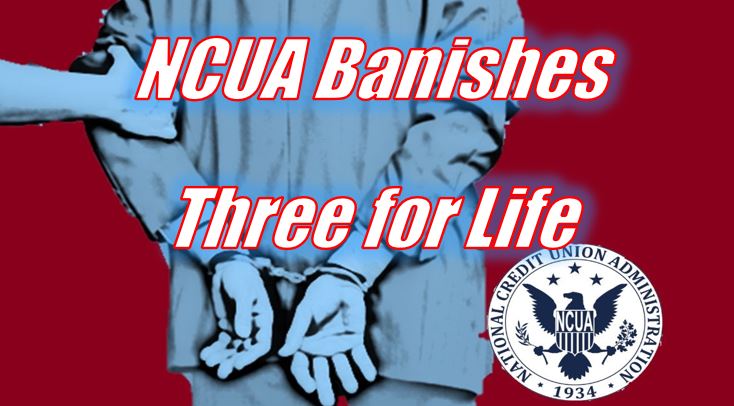
An ex-CEO, a former accounting supervisor and a loan processor, banned for life from the CU industry
Alexandria, VA – April 29, 2022 – The National Credit Union Administration has issued three prohibition orders and one notice of prohibition in April. These individuals are prohibited from participating in the affairs of any federally insured depository institution.
Order of Prohibition:
- Mark Colley, a former CEO of First Oklahoma Federal Credit Union, Tulsa, Oklahoma, agreed and consented to the issuance of a prohibition order and agreed to comply with all its terms to settle and resolve the NCUA Board’s claim against him. While employed at First Oklahoma, Colley allegedly altered term limits and payment statuses on member loans, impacting the credit union’s reports on delinquencies, according to NCUA filings.
Colley allegedly advanced due dates on multiple loans on multiple occasions to extend the time that borrowers had to make loan payments. The federal agency also alleged that Colley advanced funds from closed end loans and transferred those funds to member accounts to make payments on those same loans or other loans.
The NCUA did not however report how many loans or the amount of monetary value these loans had. It also did not report how many payment extensions were granted or whether or not the credit union lost any money.
Colley also allegedly filed reports to the credit union’s board of directors and the NCUA that understated loan delinquency figures, which harmed the credit union and benefited Colley. The NCUA does not report in what way the former CEO benefited from what it called his personal honesty and his unfitness to serve at any insured credit union.
At year-end 2019, First Oklahoma FCU reported a loss of $128,151, and at year-end 2020, $305,623.
Colley has not admitted to or denied any wrongdoing according to the consent order shows.
- Barbara Diane Nelson, a former accounting supervisor at Gerber Federal Credit Union, Fremont, Michigan, agreed and consented to the issuance of a prohibition order and agreed to comply with all its terms to settle and resolve the NCUA Board’s claim against her.
According to the NCUA, Nelson embezzled funds from the $228 million Gerber Federal Credit Union in Fremont, MI, between November 2011 to February 2019.
Nelson was sentenced in December after pleading guilty in a state court to embezzlement and using computers to commit a crime. The NCUA did not report how much she embezzled, whether she served any jail time, or whether she paid restitution.
According to Nelson’s attorney, Lance C. Hendrickson in Whitehall, MI., Nelson embezzled $25,035, which she had repaid before sentencing.
Nelson served 108 days of her 150-day jail sentence, and received early release because of the pandemic, Hendrickson said.
Nelson is on a 60-month probation.
Notice of Prohibition:
- Indira Mohabir, a former business loan processor at Western Federal Credit Union, Torrance, CA., was sentenced in U.S. District Court, Central District of California, on several charges of financial institution fraud.
Mohabir, was sentenced to 18 months of home arrest by a California Federal Judge in January for opening nearly $3 million in lines of credit for her boyfriend. The scam caused more than $1 million in losses at the former Western Federal Credit Union, which is now $4B Unify Financial Credit Union based in Allen, Texas.
Prosecutors sought a 57 month prison sentence due to Mohabir’s refusal to accept responsibility for her actions or even acknowledge any wrongdoing. After fired from Unify Financial, Mohabir went on to work at another bank before charged. According to court documents, even there, she attempted to abuse her inside position to open more credit lines for Cook.
Mohabir met her boyfriend, Phillip Cook, through the credit union’s dedicated business member hotline where they quickly became involved in a romantic relationship. According to prosecutors, it was then, during their romantic discussions, that their discussions on how to open credit lines commenced. Mohabir eventually agreed to abuse her position to help Cook open these credit lines, prosecutors said. Last January, Cook was sentenced to six months in federal prison and 12 months of home confinement.
Administrative orders are formal enforcement orders issued by the NCUA pursuant to Section 206 of the Federal Credit Union Act. Generally, the NCUA issues administrative orders when it finds that a credit union or persons affiliated with a credit union have violated a law, rule or regulation, breached a fiduciary duty, or engaged in an unsafe or unsound practice.
The three most common orders issued by the NCUA include:
- An Order to Cease and Desist, which requires a party to take action (or refrain from taking action), including making restitution;
- An Order of Prohibition, which prohibits a party from ever working for a federally insured depository institution; and
- An Order Assessing Civil Money Penalties.
NCUA also issues Notices of Prohibition, which is a notification that a person has been convicted of a criminal offense involving dishonesty or breach of trust and is barred from working for a federally insured depository institution by operation of law.
Agency enforcement orders and notices are searchable by name, institution, city, state, and year at the NCUA’s Administrative Orders webpage. The webpage also provides links to the federal enforcement actions of federal banking agencies against other institutions or their affiliated parties.










